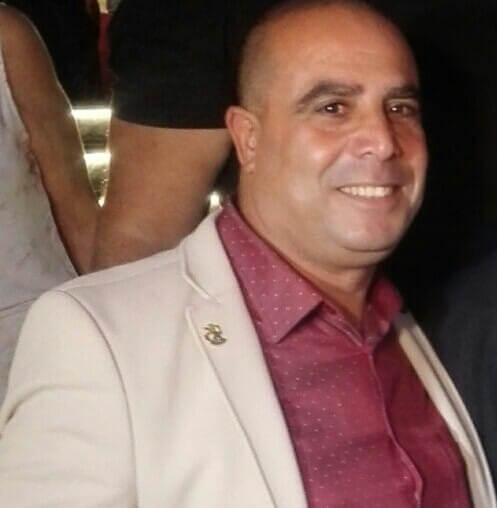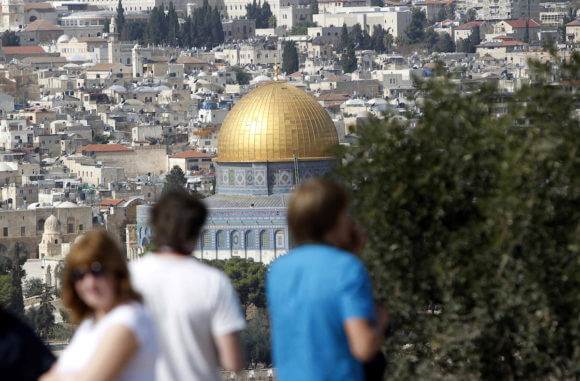Breaking with decades of policy among Palestinian political factions and religious leaders in Jerusalem, Ramadan Dabash, 53, a Palestinian man from the Sur Baher village of occupied East Jerusalem, is putting his name on the ballot for the Jerusalem Municipality elections this October.
“It was not an easy decision for me to enter the municipal elections in Jerusalem,” he told Mondoweiss, “but I felt I had to.”
Dabash cited the ongoing demolition of Palestinian homes in East Jerusalem, inability to obtain building permits, crumbling infrastructure, and overall lack of services for Palestinian Jerusalemites as his motivation for running.
His run in the elections have reignited a long-held debate in the community over Palestinian participation in the elections.
Many leaders and activists have called on him to step down, saying his run would be an act of “betrayal” and “normalization.”
Since Israel’s occupation of East Jerusalem in 1967, the city’s Palestinian residents — who number around 360,000, 40% of the population — have been under the control of Israel’s Jerusalem Municipality, and have largely boycotted local elections under the premise that Palestinian participation would legitimize Israel’s illegal occupation of the city.
Designated by Israel as “permanent residents” of the city, Palestinians are eligible to vote in the city’s municipal elections, but not the country’s national elections. The majority, however, boycott the elections under the premise of Israel’s illegal occupation of East Jerusalem.
Inside Israel, around 1,361,800 Palestinians who have full citizenship have national voting rights, and in the 2013 national elections, voter participation was measured at around 56%.
Meanwhile, in the last Jerusalem municipal elections in 2013, an estimated 1% of Palestinian residents of the Jerusalem participated. In all of East Jerusalem, there will be six polling stations this year, compared to 187 polling stations set up for Jews across the rest of the city, according to Haaretz.

Dabash’s grievances with the municipality are rooted in decades of neglect, and systematic targeting, of Palestinians in Jerusalem by the municipality.
“There is a 900 million shekel budget that should go toward East Jerusalem services. But in reality, barely a third of that gets put into our communities by the municipality,” he said.
Israel rarely grants Palestinians permits to build in East Jerusalem, while construction by Israeli settlers in East Jerusalem continues to increase. Meanwhile, in other parts of Jerusalem, Jewish construction remains unhindered.
According to Daniel Seidemann of the NGO Terrestrial Jerusalem, “Since 1967, the Government of Israel has directly engaged in the construction of 55,000 units for Israelis in East Jerusalem; in contrast, fewer than 600 units have been built for Palestinians in East Jerusalem, the last of which were built 40 years ago.”
“The situation for Palestinian in East Jerusalem is really tough,” Dabash told Mondoweiss, “and people don’t have anyone to represent them in the municipality.
Dabash is the head of the Arab list in the elections, called Al-Quds al-Maqdisiyeen, or ‘Jerusalem for Jerusalemites’. According to Dabash, it consists of 22 residents of Palestinian neighborhoods and villages across East Jerusalem.
He believes that if they were to win seats in the election, he would be able to combat anti-Palestinian sentiment and policies in the municipality.
“Right now, they (Israelis) don’t want Arabs to be in the Municipality, because they don’t want people to question them about the lack of services in East Jerusalem and oppose the home demolitions that go on,” he said.
“But if I were to win, I believe I could make a difference,” he said adamantly, as he listed off his future plans if he were to be successful in October.
“The first thing I will do is to allow Palestinians to build in East Jerusalem, to put forward community construction plans for the area, which could retroactively help people that are currently under threat of demolition,” he said.
Dabash also hopes to fix and expand the road network in East Jerusalem, and improve the education system in by hiring more local teachers, increasing the number of classes available, upgrading books to more adequately affect Palestine life in Jerusalem .
Dabash’s plans for the city have been met with intense backlash from the local Palestinian community in Jerusalem, as well as leaders in the Palestinian Authority (PA), who criticize his political aspirations as naive, and his participation in the election as betrayal.
“Ramadan Dabash does not represent us as Palestinian Jerusalemites,” Samer Abu Eisha, a young activist from the Old City of Jerusalem, told Mondoweiss. “He only represents himself.”
In the eyes of Abu Eisha, and arguably, the majority of Palestinians in Jerusalem who have boycotted municipal elections for years, Dabash’s participation this year only serves to whitewash the reality of the occupation in Jerusalem.

“If you go around the streets of East Jerusalem, even the smallest children will tell you that we are under occupation,” he said. “We should not participate in the systems that oppress us, including in the elections.”
Despite a sense of optimism from Dabash, who said he expects a great turnout for him and his slate on election day, Abu Eisha remained unconvinced.
“He won’t take even 1% of the votes, and that is because Palestinians are morally opposed to this kind of normalization of the occupation,” he said.
“Even in the impossible case that Dabash did win, he would not be able to change anything,” Abu Eisha continued.
“It’s impossible to change anything in the municipality as a Palestinian,” he said, “because the municipality is part of Israel’s security apparatus that operates in order to fulfill Israel’s vision of Jerusalem as a Jewish city.”
“For decades, the municipality has worked to try to kill any proof of Palestinian culture or heritage, or Muslim identity in Jerusalem. So to be a part of the municipality will not change anything, it will just validate Israel’s occupation and illegal and oppressive presence in East Jerusalem.”
Abu Eisha pointed to the Palestinian ministers in the Israel’s parliament, the Knesset, as a prime example.
“They thought they could change things from the inside, and look what happened, Israel passed the Nation State law,” he said.
“For a Palestinian to be in the elections is disgraceful, and makes our people look bad by legitimizing the occupation and its agencies,” Abu Eisha said.
Dabash is not the first Palestinian to run in municipal elections in Jerusalem. In the 80s and early 2000s two Palestinians ran for elections, but either dropped out due to pressure from the community, or did not receive enough votes to win seats.
As news of his campaign spread, several Palestinian leaders called on him to step down, as his participation would normalize the occupation.
PLO Secretary-General Saeb Erekat’s reiterated calls on Palestinians to boycott the elections, while the Grand Mufti of Jerusalem, the most significant religious figure in Jerusalem, has done the same.
Despite widespread disapproval of his campaign, and repeated calls to step down, Dabash said he will take his run all the way to election day.
“There are some people from the PA and other religious leaders who say I am betraying my country, but they don’t have the right to tell me these things,” he said, pointing to the fact that Erekat is not from Jerusalem.
“The PA goes on and on, talking about how Jerusalem is the capital of Palestine, but they have done nothing about it, for 51 years since we have been under occupation, they have done nothing,” Dabash said.
“I do not see my participation in the elections as normalization. I see it as me going to take my rights for me and my people, the rights and services that we deserve.”
Abu Eisha says he refuses any “excuses” put forth by Dabash as to why he is running.
“These groups like Dabash’s, they validate the occupation, by pretending like it is a fair democracy in which we have a say,” an impassioned Abu Eisha told Mondoweiss.
“We are living under occupation. It doesn’t make sense for people under occupation to partake in the elections of our occupiers,” he said.
When asked if he, as a Jerusalemite, would be happy to benefit from better services if a Palestinian were to be elected, Abu Eisha responded matter of factly.
“We should not ask for our rights from an occupation,” he said.
“We don’t need a better police station, or better Israeli services in Jerusalem. I don’t want an Israeli police station. I don’t want Israeli services. I don’t want to make my life better under occupation, I want the to occupation to leave.”



https://www.aljazeera.com/indepth/features/aziz-abu-sarah-mayor-jerusalem-suing-israel-180915053358754.html
“A Palestinian in occupied East Jerusalem is breaking boundaries, suing Israel in hopes of running for the seat of mayor.”
by Jaclynn Ashly, 15 Sept 2018
East Jerusalem – “A Palestinian in occupied East Jerusalem is breaking boundaries by suing the Israeli government in hopes of becoming the first Palestinian to run for mayor in Israel’s municipal elections in Jerusalem next month.
EXCERPT:
“Aziz Abu Sarah, 38, announced his intention to run for mayor last week, as part of the Palestinian-run Al-Quds Lana (‘Jerusalem is ours’) list, which is contending for seats at Jerusalem’s city hall in October.
“Israeli law forbids Palestinians in East Jerusalem from running for the post of mayor because they are not considered Israeli citizens.
“Therefore, Abu Sarah has decided to sue the Israeli government in Israel’s High Court over the law.
“‘I’m putting Israel to the test,’ Abu Sarah told Al Jazeera.
“‘Israel claims to be a democracy. Yet we (Palestinians) are 40 percent of the residents in Jerusalem, and we are not allowed to run for the most important seat in the city.’
“Calling ‘bluff’ on Israel’s democracy”
“When Israel occupied and subsequently annexed East Jerusalem in 1967, Palestinians there were not given Israeli citizenship, but were instead issued Jerusalem residency IDs, which can be revoked by Israel for a host of reasons.
“Nearly 15,000 Palestinians have had their Jerusalem IDs revoked in the last 50 years, according to Human Rights Watch. “